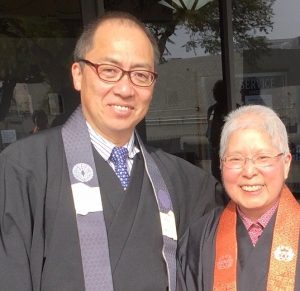
By Rev. Patti Nakai
Imagine a race with you leading, crossing the finish line amid loud cheers and winning the coolest of prizes. Although people may think it’s true, this does not describe spiritual enlightenment. So then what does it feel like?
Buddhist texts say enlightenment is beyond description, but I think it’s like realizing all living beings deserve trophies and you’re passing them out. Recipients for example include beggars in rags, customer service clerks who gave you a hard time, tiny bugs crawling through sidewalk cracks, and scruffy weeds sprouting in a flower bed. You think, “You all deserve trophies and I’m happy to give you this token of the world’s appreciation!”
At least that’s how I view the historical Buddha and the great Jodo Shinshu teachers Shinran Shonin and Haya Akegarasu. They didn’t care about winning prizes or garnering praise for themselves, but rather, they showed the utmost respect and gratitude in their interactions with other people, despite society’s view that these beings were insignificant or despicable.
Akegarasu loved the phrase in the Larger Sutra on the Buddha of Immeasurable Life, Kai to o-jo (“all will inevitably go and be born [in the Pure Land]”). He expressed this feeling in a book title, Yo to tomo-ni, yo o koen (“together with the world, [we] transcend the world”). For Akegarasu, the Larger Sutra’s central message is that deep inside everyone is a wish (hongan) to awaken to oneness, breaking through our ego-self’s limiting shell. In the sutra, the monk Dharmakara vows there is no enlightenment for me unless everyone is enlightened together.
Last March in Los Angeles at a “Dharma Seeds” retreat for laypeople, I heard Otani University president Yasushi Kigoshi express clearly and concretely this same message. (Read my account of the retreat: “Shin Buddhist Responses to Suffering”)
To summarize, soon after the 2011 Great East Japan earthquake and tsunami, Dr. Kigoshi helped Otani students organize monthly weekend trips to a damaged area to provide whatever assistance they could provide to survivors. They named the project, “T.A.T.,” meaning Tomo-ni ayumi tai (“[We] want to walk this path together [with you]”), which they coined in English, “Transcending All Together.”
In translating the above Japanese phrases, I bracketed pronouns because the actual expressions don’t have subjects (I, we) or objects (you, them), suggesting to me transcending one’s ego-self is only accomplished when blurring the lines between “subjects” acting on “objects.”
In the Western world, Mahayana Buddhism often is viewed as bodhisattvas (that which “I” am trying to be) saving unfortunate sentient beings who are lost without “my” help. I often say in Jodo Shinshu, we can’t consider ourselves bodhisattvas (or even bodhisattvas-in-training). It’s more important to see bodhisattvas who are helping us. According to Shinran Shonin and Akegarasu-sensei, we have in life so many helpers, perhaps we should view everyone around us as bodhisattvas.
I was moved by Dr. Kigoshi’s talk of student volunteers just doing simple tasks together with tsunami survivors while listening to their stories. He understood the importance for students to relate to survivors as “fellow travelers,” rather than having an “I’m saving you” attitude of self-appointed do-gooding. Even though he’s considered a top Higashi Honganji scholar, Dr. Kigoshi didn’t feel right “teaching” Buddhism to survivors. Rather in listening to their stories and spending time with them, he felt they taught him truly about life.
To be a disciple of the Buddha means doing what we can while walking the path with others and respecting them as worthy individuals, not seeing other people as pitiful souls that need our salvation. Dr. Kigoshi and the student volunteers show us by example how to live the Dharma rather than preach it. I hope for myself and our temple members, we may learn by listening to other people’s struggles, especially those who are different from us in appearance, status, culture, religion, and so forth. Spiritual awakening –enlightenment – must be about transcending together with all, not just for oneself and a chosen few.
Rev. Patti Nakai is minister of Buddhist Temple of Chicago, Illinois, U.S.A.

